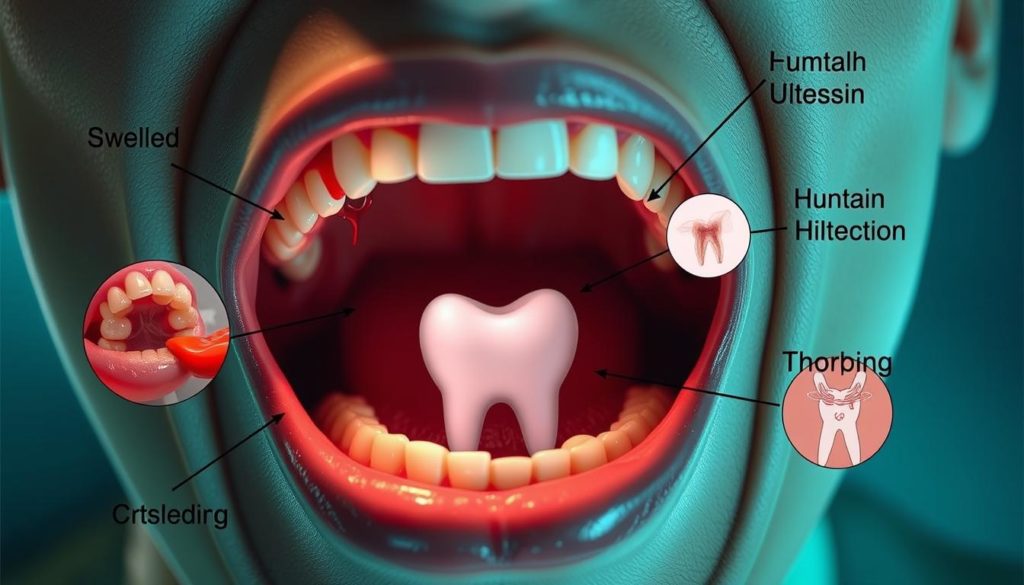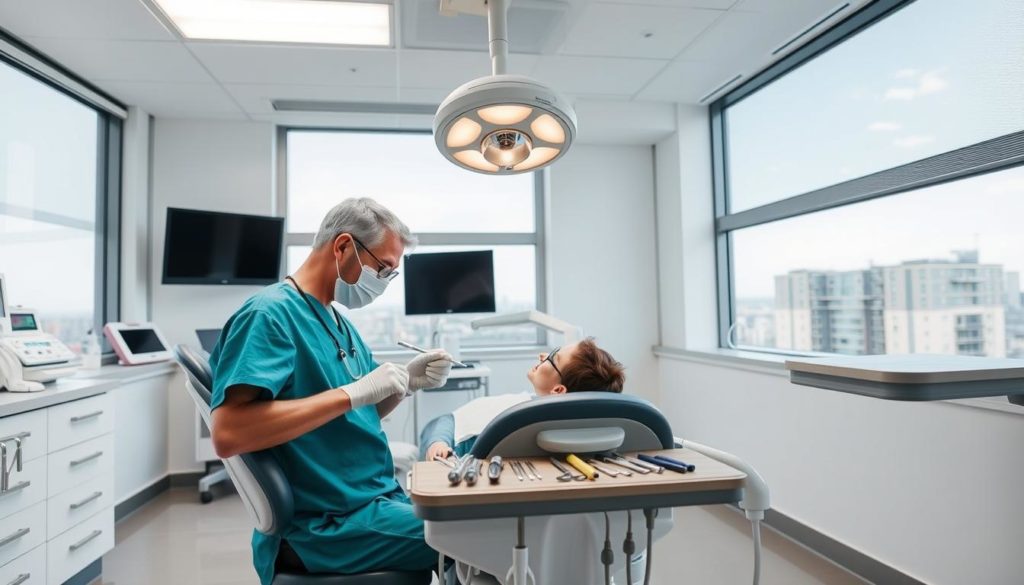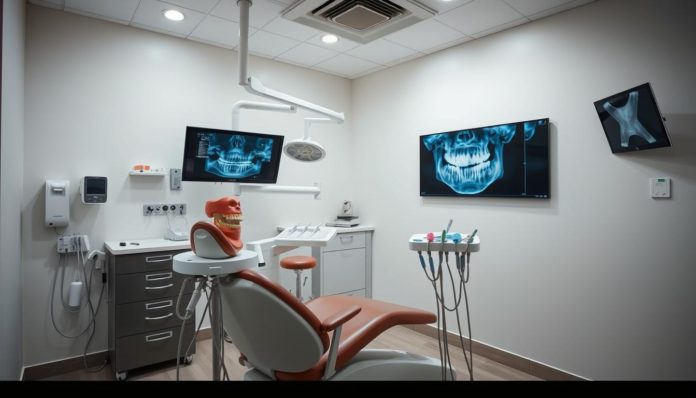Did you know that nearly 22% of adults have felt dental pain in the last six months? Understanding when to seek emergency dental care is essential. It helps keep your oral health in check.
Have you chipped a tooth, can’t stand a toothache, or had a sudden accident? Knowing when to find urgent dental services is key. Fast action eases pain and prevents worse problems. This guide shows you how to deal with dental emergencies, what signs to look for, and what steps to take.
Next, we’ll explore different dental emergencies, how to spot them, and where to get help, like seeing an emergency dentist. Keep reading to be ready for any dental emergency.
What Constitutes a Dental Emergency?
Knowing when you have a dental emergency is key. These situations can be light or very serious and need quick action.
Common Types of Dental Emergencies
There are many dental emergencies. Here are a few you might encounter:
- Severe Toothache: This signals a bigger problem like an abscess or decay. It needs fast dental care.
- Knocked-out tooth: Act fast here. Keep the tooth wet. Going to the dentist quickly may save it.
- Persistent bleeding: Continuous bleeding after injury or a dental procedure counts as an emergency.
- Swollen Jaw: This could mean infection or other major issues.
- Broken or chipped teeth: Especially if it’s painful or creates sharp edges that might hurt your mouth.

How to Identify a Dental Emergency
Recognizing symptoms of a dental emergency is important. This helps you know when you need to see a dentist right away. Here are some signs:
- The presence of intense, severe toothache that stops you from doing your normal activities.
- A knocked-out tooth needs fast help to heal well.
- If swelling or bleeding doesn’t stop with basic care, it’s an emergency.
- Quick, sharp jaw pain or swelling in the face is a sign.
- Look out for infection signs like an abscess, pus, or redness that seems off.
Emergency Dentist: Finding Immediate Help
In times of dental crisis, finding fast help can feel hard. You should know where to search and the steps to follow to lessen stress. For emergency dental needs, whether it’s a 24-hour dentist or an emergency clinic, having the right details is key.

- Local Searches: Begin by looking for an emergency dental clinic or a 24-hour dentist nearby. Use online search engines and dental groups for trusted listings.
- Hotlines and Helplines: Dental emergency hotlines can quickly direct you to the closest urgent care.
- Online Resources: Explore sites focused on finding emergency dental services. They often have filters to make finding a 24-hour dentist easier.
When calling an emergency dental service, you should have some info ready:
- Description of Symptoms: Describe your dental issue well, including pain, swelling, or any damage you see.
- Medical History: Keep your medical and dental history ready, especially recent treatments or conditions that matter.
- Insurance Details: If insured for dental, share your policy info to make things go smoothly.
Knowing what to do when you contact an emergency dental clinic helps a lot. You will likely need to talk about your symptoms. You might also get advice on how to handle your situation until you see a dentist. This way, your urgent dental care needs are met fast and well.
| Steps | Details |
|---|---|
| Local Searches | Search online for local emergency dentists and clinics |
| Hotlines | Use dental emergency hotlines for immediate assistance |
| Online Resources | Check specialized websites for emergency dental services |
| Prepare Information | Have symptoms, medical history, and insurance details ready |
Having this information ready means you can find the emergency dental care you need quickly and efficiently during a crisis.
Tooth Pain Relief: At-Home Solutions and Professional Care
Having a toothache is very troubling. People often search for immediate tooth pain relief by trying home cures or seeing an emergency dentist right away. Knowing the range of options helps handle the issue.
Temporary At-Home Remedies
Tooth pain can come on without warning. At home, you can try several home remedies for toothache for short-term relief before going to the dentist. Some familiar methods include:
- Applying a cold compress to lessen swelling and numb the pain
- Taking pain relievers like ibuprofen from the store
- Gargling with warm salt water to clean the mouth and lessen swelling
- Using clove oil because it’s a natural painkiller
When to Seek Professional Help
Home remedies for toothache are only quick fixes, not lasting solutions. It’s vital to know when to see an emergency dentist for immediate tooth pain relief. You should seek a dentist if you have:
- Intense pain that over-the-counter drugs can’t help
- Swelling in your face or jaw
- A high fever along with tooth pain
- Teeth that are broken or have fallen out
Seeing a dentist quickly is key to fixing the root problem and avoiding more issues. An emergency dentist visit also offers immediate tooth pain relief. Treatments provided may include fillings, root canals, or tooth removal when needed.
Urgent Dental Care: When to Go to an Emergency Clinic
Knowing when you need urgent dental care is key to keeping your mouth healthy. Acting fast can stop bigger problems and relieve pain quickly. An emergency dental care service is here to help with major issues that need quick help.
Choosing the Right Emergency Dental Clinic
Picking the best emergency dental clinic is important for getting good and fast care. Think about these points:
- Hours of Operation: Make sure the clinic is open when you might have an emergency.
- Location: Pick a place you can get to easily if you’re in a crisis.
- Services Available: Check that the clinic has all the services you might need for dental emergencies.
- Reputation: Read reviews and ask for recommendations to find a trustworthy clinic.
Tips for Faster Service at an Emergency Clinic
To get help faster at a walk-in dental clinic, follow these tips:
- Call Ahead: Let the clinic know you’re coming to make sure they’re ready for you.
- Prepare Documentation: Have all your medical info and ID ready to speed up check-in.
- Arrive Early: Being early can mean getting seen sooner, especially if it’s first-come, first-serve.
- Stay Calm: Being calm helps you explain your symptoms better, which helps the dental team assist you quickly.
Dealing with Broken Tooth Repair
Having a chipped tooth or a break is scary. Yet, acting fast and right matters a lot. Here are steps for effective broken tooth repair:
- Assess the Damage: Look at how bad your broken or chipped tooth is. If it hurts a lot or bleeds, you might need emergency dental treatment.
- Preserve Any Pieces: Try to save any broken pieces. It helps to keep them moist.
- Rinse Your Mouth: Clean the area with warm water. This helps prevent infection.
- Apply Gauze: Use gauze or a clean cloth to stop any bleeding by pressing on it.
- Cold Compress: Put a cold pack on your cheek to lower swelling.
- Seek Professional Help: Always see a dentist for broken tooth repair. They will offer the right emergency dental treatment to fix your tooth.
Getting checked by an emergency dentist is vital for a chipped tooth or break. They have ways to fix the damage and stop more issues. Getting help quickly and from a pro makes sure your teeth stay healthy.
Knowing how crucial professional emergency dental treatment is, is key. Act fast and follow these steps to ease pain and get your smile back right.
Swollen Jaw Treatment: Causes and Solutions
A swollen jaw can be concerning and is often caused by various factors. It’s important to recognize the causes and act accordingly for effective treatment. Knowing what to do, especially if it’s caused by an infection, can ease discomfort and prevent more problems.
Common Causes of a Swollen Jaw
There are many reasons for a swollen jaw. Each has its own challenges and symptoms. Here are some common causes:
- Infection: Bacterial or viral infections can lead to swelling. Dental abscesses are a common reason.
- Injury: Jaw swelling can occur from trauma or injury.
- Dental Issues: Swelling can result from severe tooth decay or impacted teeth.
- Medical Conditions: Conditions like mumps or arthritis may cause a swollen jaw as well.
Immediate Steps to Take
If your jaw is swollen, you should follow certain steps right away. These actions can lessen symptoms and stop the situation from getting worse.
- Assess the Pain Level: Severe pain or fever can mean an infection. This may require urgent dental care.
- Apply a Cold Compress: A cold compress can reduce swelling and ease pain.
- Avoid Solid Foods: Eat soft foods and don’t chew on the swelling’s side to prevent further irritation.
- Over-the-Counter Medication: Pain relief can be found with medicines like ibuprofen.
- Seek Professional Help: If swelling continues, see a dentist immediately for a check-up.
Getting to know the causes of a swollen jaw and taking quick steps can greatly help your recovery. If you think it’s an infection or a serious problem, talk to a dentist right away for treatment.
Dental Injury Treatment: Steps to Take Immediately
Getting hurt in the mouth can be really tough. Knowing what to do right away can really help. Let’s talk about the key moves to make right after a dental injury happens.
- Control Bleeding: First, clean your mouth gently with warm water. Then, use some gauze or a clean cloth to stop the bleeding by pressing softly.
- Address Pain and Swelling: You can lessen swelling and ease the pain by putting a cold pack on your mouth or cheek. Painkillers like ibuprofen are good for reducing pain too.
- Caring for a Dislodged Tooth: If a tooth comes out, hold it by the top, not the root. Clean it lightly with water, but don’t rub off any tissue that’s attached. Try to put it back in its spot if you can. If not, keep it in milk or saltwater and go to the dentist right away.
After a dental injury, it’s key to get to a dentist quickly. Quick help can save a tooth and stop other problems. If you’re not sure how bad the injury is, it’s always smarter to check with a dentist fast.
| Type of Dental Injury | Immediate Step | Urgency of Care |
|---|---|---|
| Chipped or Broken Tooth | Rinse mouth, save pieces, apply cold compress | High |
| Dislodged Tooth | Reinsert if possible, store tooth in milk | Immediate |
| Soft Tissue Injury | Rinse mouth, apply pressure to control bleeding | Moderate |
Quick and correct action after a dental emergency can really impact recovery. Knowing what to do is key to handle a dental injury well.
Emergency Dental Services: What to Expect
When you face a dental crisis, knowing what services are offered can reduce stress. You’ll learn about typical procedures and money matters. This prepares you for your visit.
Types of Services Available
Emergency dental work aims to soothe pain and stop more harm. Services often include:
- Tooth Extractions: Needed when a tooth is too damaged.
- Root Canals: They save an infected tooth.
- Repairs: Mending broken teeth or fillings.
- Pain Relief: Handling bad toothaches and infections.
It’s key to understand procedure expectations. This eases fears about emergency dental visits. Knowing about treatments helps make quick, informed choices.
Cost and Insurance Considerations
Handling emergency dental care costs can seem tough, but affordable options exist. Important points include:
“Many dental insurance plans cover emergency treatments, but it’s essential to check the specifics of your policy.”
| Service Type | Estimated Cost | Insurance Coverage |
|---|---|---|
| Tooth Extraction | $75 – $300 | Usually Covered |
| Root Canal | $700 – $1,500 | Partially Covered |
| Dental Repair | $150 – $400 | Partially Covered |
| Pain Relief | $50 – $200 | May be Covered |
Knowing these costs and insurance helps is key. It ensures you get vital care without huge money worries. Pre-planning can greatly ease the shock of sudden dental issues.
Dental Emergencies: Quick Action for Better Outcomes
When unexpected dental issues arise, acting fast is crucial. An immediate emergency dental response can relieve pain quickly. It can also keep your teeth in good shape.
Knowing how to manage pain during a dental crisis is important. Whether it’s a broken tooth, bad toothache, or swollen jaw, quick action can lessen problems. It also helps you heal faster. It’s essential to know when and how to get professional help to keep your teeth healthy.
“Timely intervention in dental emergencies can save teeth and prevent further oral health issues. Always contact an emergency dentist at the first sign of trouble.” – American Dental Association
To act fast in dental emergencies, be ready. Have your emergency dentist’s contact info close by. Know some home remedies for temporary relief. Being prepared enables a quick and effective emergency response. It also ensures fast pain relief, which is good for your dental health.
| Action | Benefit |
|---|---|
| Immediate Professional Consultation | Ensures accurate diagnosis and treatment |
| Effective Pain Management | Reduces discomfort and prevents further damage |
| Swift Emergency Dental Response | Enhances likelihood of tooth preservation |
To ensure a better outcome from dental emergencies, quick and informed action is key. Following these steps protects your dental health. It ensures you get the best care fast.
Conclusion
Ending our detailed guide on dental emergencies, we’ve learned preparedness can make a big difference. Sudden dental problems can happen anytime, making knowledge and preparation key. Knowing common emergencies and when to get help means faster, more effective reactions.
Keeping your teeth healthy is the best way to avoid dental problems. Regular check-ups and good oral care are important. They help prevent emergencies. But if an issue comes up, acting quickly matters. At-home care can help for a little while, but you’ll often need a dentist to fix the issue completely.
We wrote this article to give you the advice you need for dental surprises. Acting fast, like easing pain or handling a broken tooth, stops small issues from getting worse. Keep this guide close. It’s a great tool for keeping your teeth healthy and being ready for any dental emergency. Taking care of your teeth now protects your smile and your health later on.
FAQ
What qualifies as a dental emergency?
Severe toothaches, knocked-out teeth, and injuries to your mouth count. They demand quick care from an emergency dentist.
How can I quickly find an emergency dentist?
Search online for emergency dental clinics near you or call hotlines. 24-hour dental services can also help you find urgent care.
What are some at-home remedies for tooth pain relief?
Use cold compresses and over-the-counter pain meds for relief. Saltwater rinses help too. But remember, these are only quick fixes.
When is it time to visit an emergency dental clinic?
Go if you have severe pain, swelling, or a broken tooth. Don’t wait for a regular dentist visit with these symptoms.
How do I handle a broken tooth?
Rinse your mouth with warm water and save any pieces. Use a cold compress to reduce swelling. Then see an emergency dentist right away.
What should I do if my jaw is swollen?
For a swollen jaw, apply a cold compress. Then quickly seek emergency dental care to find and treat the cause.
What first steps should I take after a dental injury?
First, use gauze to control any bleeding. Apply a cold compress for swelling. Get emergency dental care to manage the injury properly.
What services do emergency dental clinics offer?
They provide pain relief, treat infections, and repair broken teeth. They’re set up to tackle various dental emergencies.
How does dental insurance work for emergency dental services?
Emergency procedures are often covered, but coverage varies. Know your plan’s details and be ready for any costs.
Why is quick action important in dental emergencies?
Fast response helps manage pain, save teeth, and prevent serious problems. Quick action leads to better dental health outcomes.


